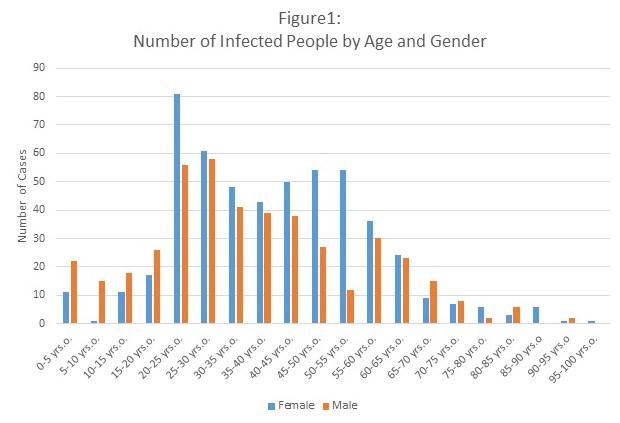In this article, we briefly discuss the recent developments and policies regarding COVID-19 in Kazakhstan.
The policies regarding COVID-19 are constantly being revised and extended by the government. The first patients with COVID-19 in Kazakhstan were registered on March 13, 2020. They had recently returned from Germany and Italy. President Kassym-Jomart Tokayev introduced a state of emergency from March 15 until April 16, 2020 (for details see here) .
On March 19, Nur-Sultan (the capital city) and Almaty (the former capital) were quarantined and entry was restricted. On March 22, these cities were placed under lockdown. Later on, other cities also joined the quarantine.
Figure 1 shows the number of infected people by age and gender. The number of cases is still relatively small compared to other countries. Thus, we may conclude that Kazakhstan is still in the early stages. Moreover, according to Wordometers, the number of tests conducted is comparatively low (4,096 tests per 1 million inhabitants, as of April 14, 2020). Similar rates can be found in Greece (4,165 tests) and Croatia (4,303 tests).

Kazakhstan is a country where the Bacillus Calmette-Guérin vaccination (BCG) is mandatory. Recently, Miller et al. (2020) pointed out that countries where the BCG vaccine is common report fewer COVID 19 cases (see here) compared to countries where the vaccine is not routinely used.
Nevertheless, as shown in Figure 1, women between the ages of 20 and 60 years are more more likely to be exposed to the virus than men of all age groups. There are several potential explanations for this situation. First, a large number of women is employed in the public sector where they work as teachers, nurses, cashiers, catering staff, etc. These are quite sensitive sectors that are prone to COVID-19 infections and are the first to be tested. Secondly, women with children are generally socially active (i.e. visiting preschools, schools, preventive care facilities, etc.). As a result, they are in the highest risk group.
Economic Impact and Policies
Kazakhstan’s government recently approved a 4 trillion Tenge bill to support the economy (ca. USD 9 billion) (see here). Moreover, citizens who lost their jobs due to the pandemic will receive 42,500 Tenge (ca. USD 95) of financial support . The socioeconomic groups entitled to this financial aid are constantly being revised and extended.
Businesspeople whose situation has worsened due COVID-19 are exempted from tax payments such as property tax, land tax, and income tax till December 31, 2020 (see here). Moreover, on March 31 President Kassym-Jomart Tokayev announced additional financial support that includes measures such as a 10% increase in retirement payments, free medical care for all citizens from April 1 until July 1, 2020, increased access to free food baskets (an equivalent of food stamps), financial support for farmers, the creation of jobs for the unemployed in big cities under quarantine, and a six-month social security payment exemption for small and medium-sized businesses.
On April 2, President Kassym-Jomart Tokayev signed a decree mobilizing men for military service (see here). It implies that all men who are able to serve can be mobilized depending on their health status and cities’ needs. Men who were unemployed before this mobilization effort will be paid the minimum wage. Those who were employed will be paid the average wage of their company/sector. Priority will be given to young volunteers. For clarification regarding these payments, follow this link for further information.
Sources:
Ministry of Health in Kazakhstan: https://www.coronavirus2020.kz/ru
KAZINFORM: https://www.inform.kz/en/president-tokayev-announces-one-month-state-of-emergency_a3625158
A. Miller, M.J. Reandelar, K. Fasciglione, V. Roumenova, Y. Li, and G. H. Otazu. Correlation between universal BCG vaccination policy and reduced morbidity and mortality for COVID-19: an epidemiological study. Working paper. Avalaible at: https://doi.org/10.1101/2020.03.24.20042937
Featured Image: Yakov Fedorov via Wikimedia Commons / CC BY-SA 4.0


Kommentare von Arsen Arushev